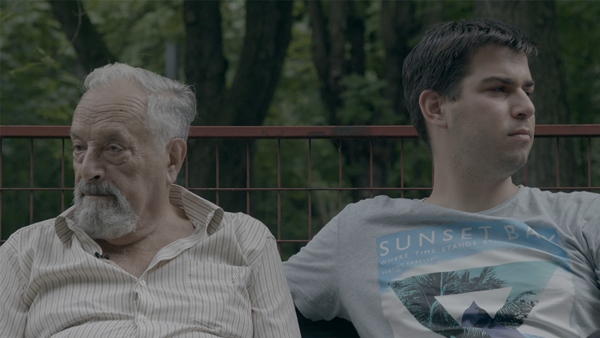Kat Rohrer and Gil Levanon’s documentary looks sympathetically, though superficially, to the past and present of Jewish families’ relationships to Germany and Austria. Something of a follow-up to Janina Quint’s Germans & Jews (2016), which took a long-term, postwar view, this hones in on the internal family dynamics for the third generation from the Holocaust and their survivor grandparents.
It opens with a classic cliché, the “trunk in the attic” of a German or Austrian family. But this one is real and personal for co-director Rohrer, and the film closes with the expected evidence inside, her grandfather’s Nazi officer uniform. To contrast, she accompanies co-director Levanon to visit her Holocaust survivor grandfather Yochanan Tenzer in Israel. Levanon tells him she is considering joining Rohrer’s mother, Anneliese, the film’s co-writer, in Berlin. His reaction is negative.
While more than 10,000 Israelis are estimated to have settled in the German capital during the past decade and established Hebrew-speaking enclaves, the directors were interested in the specific personal ramifications of those who, like several of my cousins, were also grandchildren of Holocaust survivors.
In the other two families profiled, the grandparents were born into a German society that painfully turned on them, so they felt lucky to emigrate to Israel. Their Israeli grandchildren see a hopeful potential for work, art, and romance in these countries and have an affinity for a language they heard their grandparents speak at home, albeit they know they have the safety valve of returning to Israel if history repeats itself. Many on screen express unease with the rising anti-Semitism from the right and Muslim extremists. Ruth Beckermann’s The Waldheim Waltz last year revealed that the anti-Semitism in Austria isn’t too far below the surface.
Guy Shahar left Israel for a pragmatic reason, more job opportunities (like one of my young cousins), and he then fell in love with Austrian Katharina Maschek. They share an unresolved scene where they look up the regulations for civil marriage and changing names. In Israel, his grandfather Uri Ben Rehav has a large model train set that runs through a miniature Theresienstadt, the Nazi’s “model” concentration camp, where he was imprisoned for three years.
Dan Peled, a sculptor, moved to Berlin a few years ago for its lively arts scene, as did my theater artist cousin, and like her, he feels very uncomfortable with Israel’s position toward the Palestinians. He, too, has fallen in love with a local woman, Hannah Becker. Raised with divorced parents, he grew up very close to his painter grandmother Lea Ron Peled, and wants them to meet.
The most moving scenes are the Jewish grandparents’ return to their native lands and the interactions there with their grandchildren. With his grandfather’s interest in trains, Guy takes Uri on a tour of Vienna that includes a ride on a child-size train in a park where Jews were banned. This reminds the chuckling Uri of the time he removed his yellow star in order to see a public display of the German might that had just defeated France. While riding on a streetcar with his grandson, he recalls sitting across from a man who confronted him for being Jewish and wearing a plaid jacket that included the black, white, and red colors of the Nazi party that were forbidden to him. The man took out his Gestapo badge and arrested him. Uri covers his face and can’t speak.
Dan’s father, Gidi, is able to bring his 91-year-old mother to her former apartment in Vienna and the building that housed her school, where an anti-Semitic art teacher had challenged her talent. She steps onto the school auditorium stage and recites all 16 stanzas she learned there of “The Minstrel’s Curse” by the early 19th century poet Ludwig Uhland, about a musician’s revenge on a murderous king: “Thy strife for bloodstained glory all times in vain shall be…No songs, no book of heroes the monarch’s name rehearse/Dissolved in night, forgotten!” Her memory is a wonderful testament to the lasting fondness German-speaking Jews have for their prewar culture. After her return to Israel, she doesn’t live to see her great-grandchild born in her home city. (Similarly, my artist cousin’s daughter was born in Berlin after the death of her grandmother.)
As confusing as it is to keep straight the family relationships, interspersed is a discussion in a coffee shop among unidentified young adult Germans or Austrians and Israelis. In general, it seems that enough time has gone by so that their grandparents’ experiences are too far in the past to influence the younger generations’ decisions. As one of my cousins replied to me, “That was life in a different time zone.” As the directors fade out from that Nazi uniform in the attic, the Israelis, including my cousins, want a break with the past that will lead to a different future.

















Leave A Comment